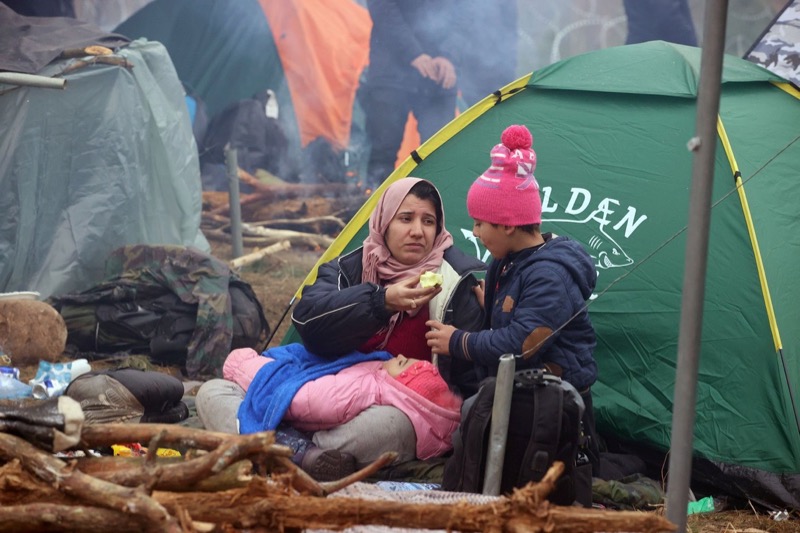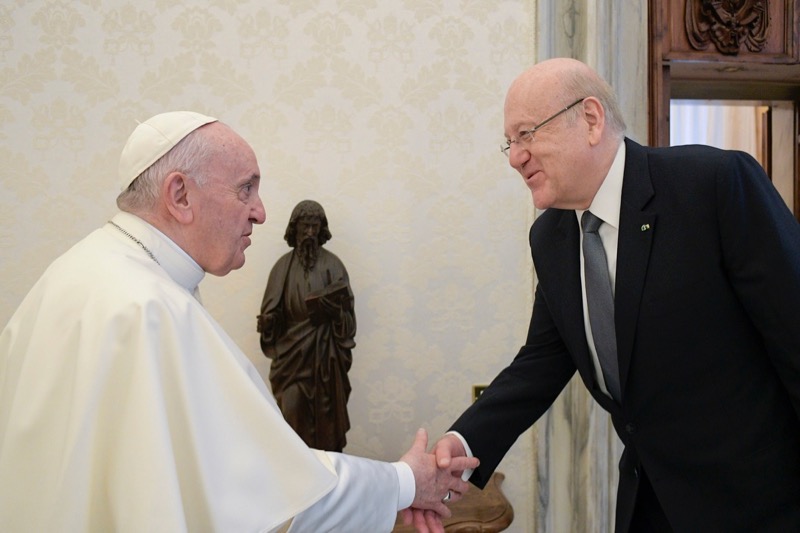When Pope Francis met the Prime Minister of Lebanon, Najib Mikati, last week in Rome he recalled the Gospel passage in which Jesus went to Jairus’ house. He added the prayer: “Lord God, take Lebanon by the hand and say to her, Get up!”
Lebanon is certainly a country in need of prayers: its economy is crippled by power cuts, rocketing prices and a plunging currency, quite apart from the effects of the Covid-19 pandemic and last year’s terrible blasts which killed 218 people in Beirut.
Children are among the worst victims of Lebanon’s deep economic plunge. The crisis was already severe among the country’s large refugee population, but is now engulfing the local community, according to Unicef, which recently reported that the education of some 700,000 children, including 260,000 Lebanese, is under threat. Over half of families reported that at least one child had been forced to miss a meal in October, while the proportion of Lebanese families sending children to work increased seven-fold.
In the education sector, teachers are leaving in droves, and many of those left are on strike for higher pay. A teacher’s monthly salary barely covers the cost of two tanks of petrol to get to work, let alone paying for food, housing or medicines.
The World Food Programme says the cost of basic food items such as oil and lentils has increased five-fold since October 2019. The Lebanese pound has lost more than 90 per cent of its market value. Medicines now cost ten times what they did, and petrol is up 600 per cent.?The financial crisis facing Lebanon could rank among the world’s three worst since the mid-1800s, according to the World Bank.
 Entertaining children in Najdeh centre. Pic: Cafod.
Entertaining children in Najdeh centre. Pic: Cafod.
More than half of Lebanon’s 6.8 million people now live below the poverty line, but one community is even worse off. Roughly 480,000 Palestinian refugees live in cramped, squalid camps, some of them since 1948, when they fled the Arab-Israeli war. The more recent influx of refugees from the Syrian war has included almost 30,000 more Palestinians. Subject to multiple disadvantages even before the present crisis – barred from many types of work, frequently forbidden to own property or build homes, suffering informal restrictions on movement outside the camps – the Palestinian community is bottom of the heap.
Covid-19 has taken a severe toll, due to lack of social distancing and low priority for vaccines. Over a fifth of the few Palestinians who had jobs lost them in the economic crash. Buthaina Saad, who works for Najdeh (“Help” in English) a Palestinian women’s organisation, has seen the impact on the community. “The situation for Palestinians is getting worse every day,” she says. “The community is going backwards.”
For many children it has meant the end of their schooldays. “Typical is the case of an 11-year-old who has dropped out to support his large family,” says Buthaina. “His father can only find seasonal work. The boy is earning 30,000 to 40,000 Lebanese pounds a day doing deliveries. Before the crisis that would have been worth about $25; now it is about $3, which would buy a loaf of bread and maybe 1.5kg of chicken. He hopes to go back to school, but his chances are pretty small.”
The Palestinian community depends mainly on UNWRA, a United Nations agency which runs 65 primaries and seven secondary schools in Lebanon. But shortage of funds has forced the agency to cut the school year from 50 weeks to 36, only half of which will be in the classroom. The other 18 weeks will be on the internet. That is the theory – in reality, education is a victim of every one of Lebanon’s problems.
Power cuts will keep schools closed and prevent internet learning. “In any case,” says Buthaina, “a family with five children might have only one mobile phone between them for lessons.” On top of that there are transport problems, Covid restrictions and lack of money for books and uniforms.
Dealing with these issues has been made increasingly difficult as the UK government has cut its aid to UNWRA by more than 50 per cent, from £42.5m in 2020 to £20.8m in 2021.
The effect on Palestinian families, particularly mothers, is drastic.
Many women used to work before the crisis, in shops and hairdressers, or cooking food for restaurants. The slump has left them vulnerable: not only do they have the added responsibility of home schooling, but domestic violence has shot up, along with abuse and exploitation of children.
One study by Najdeh found that 40 per cent of women and girls living in Palestinian camps and communities had experienced physical violence during the Covid-19 pandemic.
Buthaina described the case of a boy, aged 12. “His father was violent, and the family couldn’t cope any more. He left school 18 months ago to collect cans in the street. Now he works in a poultry shop, which is slightly better. There will be many more like him as the drop-out rate increases.”
Najdeh has provided food and cash for those self-isolating in the camps, but Covid precautions have forced the organisation to move much of its support activity online from its family centres. This has deprived women of a safe space: “They are not comfortable talking to us from home, with their husbands listening,” says Buthaina.
Now in her late 50s, Buthaina and her parents were born in Lebanon – her grandfathers fled to Lebanon from Palestine in 1948. She and her husband, a social worker, are both in reasonably well-paid work, but that has not entirely insulated them from Lebanon’s troubles. “We have two sons and a daughter,” she says. “While two are still in education, one son has graduated, but he cannot find a job.”
At the end of their meeting last Thursday, Pope Francis asked the prime minister and his delegation to join him in a moment of silent prayer. Cafod joins them all in praying for Lebanon’s children, whose future is threatened with every day that passes while the country remains gripped by crisis.
Laura Ouseley is World News Officer at CAFOD.



 Loading ...
Loading ...
What do you think?
You can post as a subscriber user ...
User comments (1)
Paul Ferris | 12/16/2013 - 4:40pm
Jesus often answered a question with a question. I am not Jesus but here is my questionnaire to the Bishops.
1. Is there anything in either the Old or New Testaments that refers to the Natural Law?
2. Have you ever read a document that does not have a title written in Latin?
3. Do you think it appropriate to invite someone to Thanksgiving Dinner and not allow them to share in the meal as you do with divorced and remarried couples who are not supposed to receive communion?
4. Do you think your recent questionnaire comports with Pope Francis's latest encyclical on the Joy of the Gospel in tone or specifics?
5. If you found that the vast majority of respondents to your recent questionnaire think there should be changes to present church policies regarding the ordination of women, the procedures for divorce and remarriage, the acceptance of same-sex marriage, an openness to limiting the size of the family through all available means would you consider making changes?
6. Have you ever read any of the results of professional polls which show the vast majority of the laity disagree with your present policies indicated in your questionnaire?
7. How would you apply Pope Francis' recent distinction between ideas and realities to your study of marriage and the fam-ily and the realities of same-sex marriage?
8. Are you aware that in States like Maryland where there is a majority of Catholics, including a Catholic Governor, laws based on referendums have